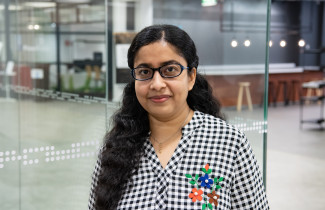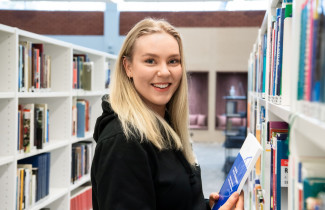Having been born and raised in a country fighting a variety of health problems and in dire need of medical professionals, healthcare was the preferred career choice for Fuh on finishing high school. He was intent on studying medicine, but due to limited opportunities in his native Cameroon, he became a clinical nurse specialist instead. In order to advance to higher level managerial positions at Médecins Sans Frontières, or Doctors Without Borders, with whom Fuh has worked since 2011, he needed to expand his knowledge in public health – which is how he ended up at the University of Eastern Finland.
Once the need to broaden his knowledge and skills in the area of public health arose, it was time for Fuh to choose his study destination. His wife had studied primary education at the University of Eastern Finland and had stayed in the country after completing her master’s degree; it was she who introduced him to the opportunities and advantages of continuing his studies here at the UEF, a university that focuses heavily on research, something Fuh is keen on.
So, Finland it was. Fuh began his studies in Kuopio in September 2019.
From disaster areas to Kuopio
Fuh’s work with Doctors Without Borders has taken him to a number of places suffering from natural or humanitarian catastrophes around Africa, Asia, and Europe. Therefore, moving to a faraway country was nothing new to him.
The process of getting an apartment and settling in was effortless. What he found particularly helpful in his new environment was the mentor system in place at the university. His mentor not only assisted him with practical matters but also showed him around, which helped him to find his feet on campus and made starting his studies easy.
Of the four study tracks offered on the programme, Fuh chose epidemiology, because in his work he deals with a variety of diseases and moves in epidemic-ridden areas. Studying public health, in general, and epidemiology, in particular, would give him new tools he could use in those contexts.
When starting his studies, Fuh was prepared for intensive research-focused lectures.
“I came with the expectation that I would improve my research skills. And that is what I have achieved,” he says.
Language barriers
Coming to Finland, Fuh expected the language to be a challenge in his new environment. In the end, due to strict Finnish language requirements, he did not manage to secure an internship for himself.
He feels strongly about the limitations language requirements place on students. Nonetheless, he is well aware of the importance of learning Finnish and is not expecting to be offered long-term employment without sufficient language skills. What he is asking for is, quite simply, a place to practice his skills.
“If Finland offers English-language programmes, they should work together with companies or institutions to enable students who don’t speak Finnish to also have the possibility to do their practical training here. I would really want to apply my skills here in Finland and not just take my degree and go,” he says.
In his opinion, as more and more Finnish universities offer programmes in English, there is a real need for the country to find a way to integrate English-speaking people – something that would certainly benefit the nation, too. After all, as he points out, the government invests a lot of money in these kinds of programmes, so why not make good use of them?
However, he is happy about the fact that the university then gave him the opportunity to work on the very topic of internships. As part of this, he drew up a list of organisations in Finland and elsewhere for the university, so as to help other students find internships. A list such as this one, he thinks, would have been useful for him, too.
Interdisciplinarity and encouragement
Living in the international atmosphere of Kuopio was a great experience for him. Apart from missing out on doing his internship, he found studying at the UEF excellent and felt that his expectations were met.
“The whole environment is friendly and welcoming, which is encouraging and keeps you at ease. It makes you carry on and helps you focus on studying,” he says.
As Fuh’s future plan is to work more on data, he particularly enjoyed the interdisciplinary nature of the studies.
“What I appreciate a lot is the fact that students have the opportunity to take courses from other departments. I, for instance, took a lot of courses in statistics from the department of computer sciences,” he says.
Fuh also points out that students get a lot of support from the lecturers and are really encouraged to participate in ongoing research projects and even write articles, something that elsewhere might be reserved for PhD students only.
“The UEF is a great institution, especially for those who are research focused,” he states.
The standard of teaching is high in Finland, and Fuh thinks that by studying here you will improve yourself, your knowledge, and your skills. What also speaks in favour of Finland is the fact that studying is affordable here compared to, for example, the USA and the UK, which makes it all possible.
“Finland makes studying and obtaining a degree available to you,” he says.
As far as future plans are concerned, Fuh is first off on an intensive six-month stint in Central Africa with Doctors Without Borders. He is scheduled to leave two days after this interview. When he comes back to Finland, he plans to embark on doctoral studies – and fully engage in the Finnish language.



